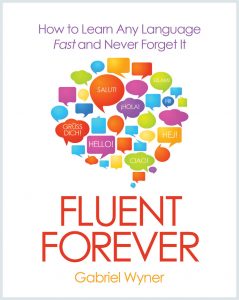In a recent post I shared with you a couple of excellent articles on how to accelerate learning Spanish. Found on Tim Ferris’s blog, one was by Benny Lewis and the other was by Gabe Wyner.
If you have not had chance to check either article out, then I suggest you go and have a look now.
I think I said in a previous post that it was language learning GOLD!
Both of these guys have written books and as I am on a quest to become a better language learner, I bought them both.
Each of them take a slightly different stance on what is important in learning another language but both are valid. In scanning through both books, I was personally more drawn to Gabe’s book first.
[Note – I will review Benny’s book in a later post]
So I sat down and read through it first.
 It is called Fluent Forever – How To Learn Any Language Fast And Never Forget It.
It is called Fluent Forever – How To Learn Any Language Fast And Never Forget It.
I think I was drawn to Gabe’s work for a couple of reasons. First he takes quite a technical and systematic approach to learning a language which matches my own personal style. And secondly, he has a big focus on memory which of course is a strong professional interest of my own.
So who is Gabriel Wyner?
He has an engineering background but decided to become an opera singer. His need to become at least familiar with German, French and Italian arose out of his “oversized singing habit”. Once he decided to make the career shift to sing, he also committed to becoming fluent in the languages required by his new profession.
But he wasn’t a natural language learner. As a child his abilities never seemed to extend beyond learning alphabets and a few phrases.
This book came out of his experiences of learning to speak French in just a few months so he could legitimately put himself in the intermediate level of an immersion programme.
What is obvious from his writing, both in the book and on his blog, is his incredible attention to detail. This is coupled with a refreshingly readable ability to capture and explain complex principles so they are easily understood.
So his approach can be broken down into three key principles:
- Learn pronunciation first (so you can get you lips, tongue and throat properly around the new words)
- Don’t translate (so you think in the target language and not your own)
- Use spaced repetition systems (SRS) (so you can embed what you learn in your long term memory
His knowledge and understand of how memory works is impressive and clearly he is well researched. His chapter “Upload: Five Principles to End Forgetting” had me writing copious amounts of notes about memory. I was impressed with not only his knowledge, but how well he conveyed it.
He helps you understand not only how to put things into your long term memory (without mindless and needless repetition and drills), but also how to stop you from forgetting it.
Perhaps one of the biggest challenges people face when learning a new language is being concerned about sounding “right”. He goes into extensive detail about what you can do to tune your ear and train your mouth, lips and throat to say the right things.
Check out how he can get you to pronounce this word correctly – it is quite impressive:
vzdrognu
One of the things he has created is a series of pronunciation trainers to help people like you and I get to grips with the way the language sounds. I will share more about that in a later post (yes I did buy the Spanish one!)
And then once the basics are over, we get into the meat of his approach.
Bearing the key principles in mind his approach can be summarised as follows (and this is a HUGE simplification that doesn’t really do justice to his method – so buy his book!):
A. Learn Vocabulary First
B. Start piecing the words you know with grammar
C. Practice what you know whenever you can
D. Rinse and repeat.
At the heart of his method is the use of a flashcard system for spaced repetition. His description of how to set up and use such a system is extremely thorough and very easy to follow.
I have been using Brainscape for a couple of years for my own flashcards, but Gabe recommends using Anki. I have now switched to that app and it is working brilliantly for me. It is not that Brainscape can’t do it, it is just that Gabe’s explanations are so thorough and comprehensive, switching to Anki is a no-brainer.
At the back of the book there is an extensive Gallery that explains the different types of cards in exquisite detail. So there really is no excuse not to be able to apply his approach.
Overall I found his approach refreshing, thorough and very systematic. In fact it was truly inspiring because just reading his book made me feel that I could do it too. It appealed to the way I think and was probably the perfect book for me.
HIs approach is both practical and so far (at time of writing), very effective too.
I am well aware that not everyone shares that way of thinking BUT there are some golden nuggets in this book that will help you.
This review is being written some time after I began adopting Gabe’s approach to learning. I can without hesitation say that I have made infinitely more progress following his way than I have ever done before.
Other things I like about this book:
- His resource recommendations are extensive but also practical. Clearly he has used all of these resources himself so there is no “fluff” in his recommendations. In fact after reading this book, I put a hefty order into Amazon based on his suggestions.
- His writing takes a no nonsense approach and is backed by research and explained with engaging stories and anecdotes.







Leave A Response